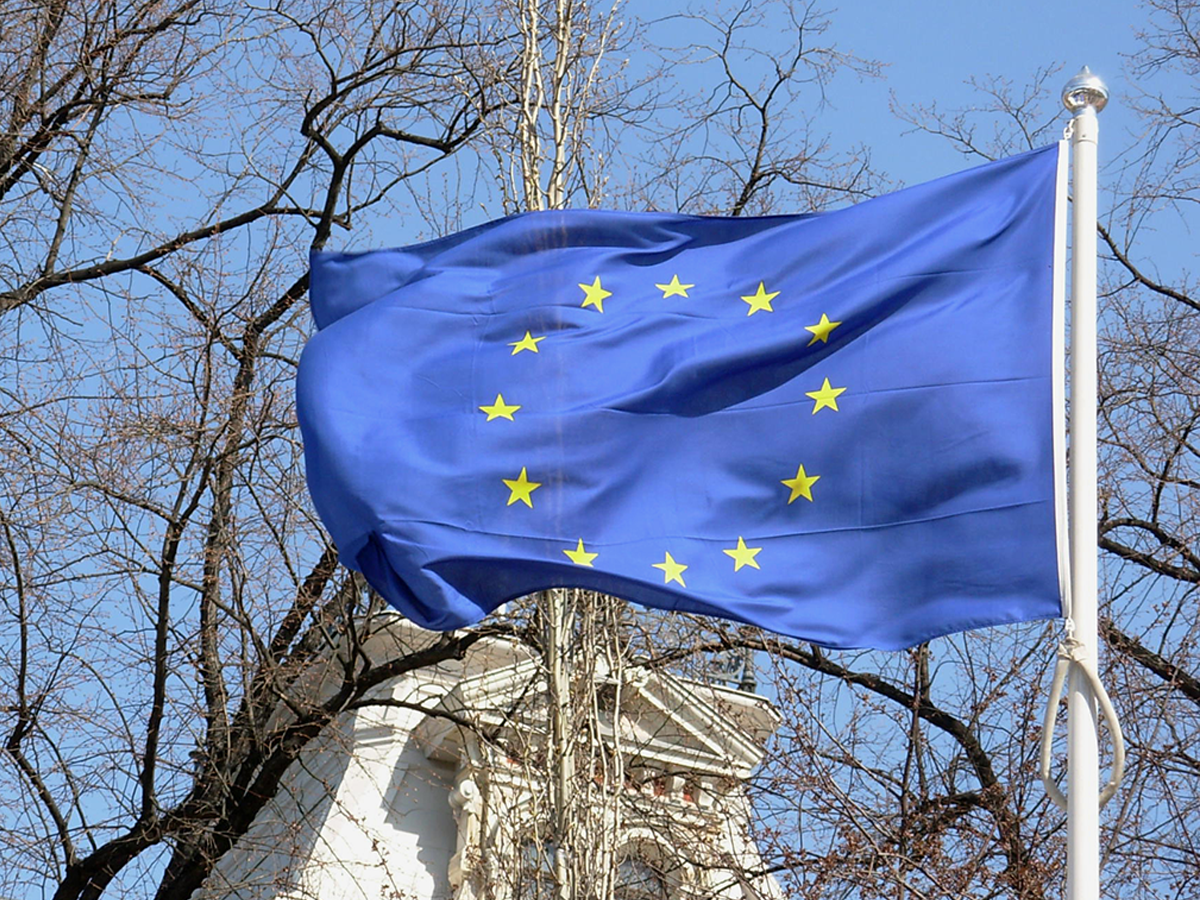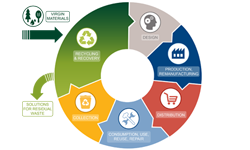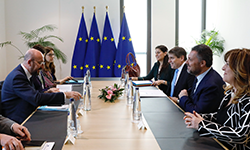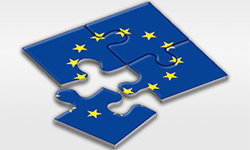BusinessEurope Headlines No. 2020-10
European solidarity essential to overcome the crisis

Following the European Council video conference on Tuesday, 17 March, BusinessEurope's President Pierre Gattaz stated that "the commitment made to do whatever it takes to address the significant crisis we are facing through a coordinated EU response is welcomed by the European business community". Member states across the EU, he added, are already taking important action, particularly to maintain companies' cash flow, and it is clear that this will be supported at EU level by a range of essential actions: drawing on the full flexibility of the Stability and Growth Pact, special measures to release EU funds, and co-ordinated action among the European Central Bank, the European Investment Bank, the European Commission and EU Member States to maintain financial stability.
"Ensuring that all businesses with viable business models survive this crisis will undoubtedly require further measures in the weeks and months ahead. BusinessEurope and our member federations will continue to work closely with governments and the EU institutions to deliver whatever measures are needed. Europe will only meet the challenge of COVID-19 with our vital business eco-system intact and ready to drive the recovery and this will require that we act in a spirit of solidarity", Gattaz said.
He also highlighted that Businesses across Europe are already showing their solidarity through exceptional actions, such as re-orientating production and sharing expertise, to deliver the medical and protective equipment so urgently needed. "It is in all our interests that this solidarity functions between all sizes of businesses, between business and governments and between member states. Above all, we must maintain the cross-European supply chains and preserve the European single market", he stated, explaining that both are vital to delivering the goods we depend upon in the coming weeks. Gattaz pointed out that we must not forget that trade and investment flows with the rest of the world are equally critical to maintain economic resilience and avoid supply shortages in Europe.
BusinessEurope published a statement setting out the immediate measures we believe need to be put in place on 16 March. We plan to update this statement as the situation develops. See also the statement of the European social partners.
![]()
![]() Contact: Nathan Munch
Contact: Nathan Munch
Our comment
Circular economy: new action plan, new stakeholder focus?
By Leon de Graaf, Adviser for Environmental and Climate Policy
 The new, long-awaited Circular Economy Action Plan was published on 10 March and marks a significant evolution from its predecessor. Whereas the previous plan, for 2015-2019, mainly focused on addressing Europe’s waste streams, the new circular mantra of the Von der Leyen Commission will more than ever focus on how products are designed.
The new, long-awaited Circular Economy Action Plan was published on 10 March and marks a significant evolution from its predecessor. Whereas the previous plan, for 2015-2019, mainly focused on addressing Europe’s waste streams, the new circular mantra of the Von der Leyen Commission will more than ever focus on how products are designed.
As up to 80% of the environmental impact of products are determined in the design phase, the ultimate goal of this renewed focus is to make products last longer. This sounds easier than it really is, as some say Europe and many other economies around the world suffer from a “throw-away” culture. To create alternatives to this, producers will try to find ways of retaining ownership of the products they produce, for example by leasing them to consumers rather than selling them, allowing producers to repair, upgrade or reuse the products better.
Consumers will be asked to take their responsibility in making sure their old products and packaging end up in the right place after they’re done using it. How this will play out remains to be seen. However, what is sure is that the communication between producers and consumers will become more important than ever, as well as how players along key product value chains cooperate.
The European Commission wants to be a part of the communication exercise. It expressed a clear commitment to closely cooperate with stakeholders to achieve the goals of the action plan. Some of the most important stakeholders will be the sectors. An entire chapter in the action plan is dedicated to explaining what the European Commission aims to achieve in sectors such as electronics and Information and Communication Technology, batteries and vehicles, packaging, plastics and textiles. It also wants to closely engage with industry sectors producing high impact products such as steel, cement and chemicals.
If those sectors are to be given a real voice to make the new action plan happen, it will be crucial to allow them to participate in the main stakeholders groups on circular economy. In particular, they should be able to join the Coordination Group of the Circular Economy Stakeholder Platform (CESP). This platform was set up jointly by the European Commission and the European Economic and Social Committee (EESC) in March 2017 to exchange best practices and good ideas across society on how to advance Europe’s circular economy agenda. The platform can be a key way for sectors to communicate the opportunities and challenges they see with the circular economy to other groups in society. For the sectors, it can be an efficient space to learn where NGOs, academia, cities and others stand on bringing circular solutions to the sectors. Currently none of the European sector organisations except for FEAD (commercial waste handlers) are individually represented in the Coordination Group of the CESP. If the CESP wants to align itself effectively with the policy cycle of the new action plan, this will have to change.
Contact: Leon de Graaf
Meeting Council President Charles Michel
 The global economy continues to change rapidly due to technological, demographic as well as environmental change. Economic times are not getting easier. The coronavirus outbreak could slash global economic growth to 1.5 per cent in 2020. Europe will not be spared as COVID-19 could push some member states into recession. Policy coordination and coherence is more important than ever to ensure that the European Union successfully tackles the short-term and long-term challenges it is facing.
The global economy continues to change rapidly due to technological, demographic as well as environmental change. Economic times are not getting easier. The coronavirus outbreak could slash global economic growth to 1.5 per cent in 2020. Europe will not be spared as COVID-19 could push some member states into recession. Policy coordination and coherence is more important than ever to ensure that the European Union successfully tackles the short-term and long-term challenges it is facing.
These were the key messages by Markus J. Beyrer, BusinessEurope Director General, in a meeting with the European Council President Charles Michel and the European social partners on 12 March 2020.
As well as providing supportive monetary and fiscal policies, it is essential that both member states and the EU provide direct support to companies with viable long-term business models which are experiencing short-term liquidity or solvency issues as a result of the coronavirus itself, or due to responsible action taken to prevent the spread of the virus.
The immediate challenges created by COVID-19 come on top of the need to progress towards an economically viable greening of our economy. While supporting the goal of moving as fast as possible to a climate-neutral economy, BusinessEurope calls on the proposed Green Deal to pay stronger attention to preserving companies competitiveness.
Contact: Maxime Cerutti
The comprehensive strategy with Africa must deliver
 Last week, the European Commission published its proposal for a comprehensive strategy with Africa. Based on this document, the EU will engage in discussions with the African Union and its members with the aim to endorse a new joint strategy at the EU-Africa Summit in October 2020. This process presents a major opportunity to build on the positive momentum created in recent years and truly turn EU-Africa relations into a partnership of equals. In a high level letter addressed to President von der Leyen, the European business community set out a number of key priorities for strengthening economic relations between the EU and Africa. These include the deepening of our Economic Partnership Agreements with African regions, which need to be used as building blocs to continental free trade; creating flexible financing instruments to leverage EU private investment in Africa by mitigating risk; providing people with the skills required by the labour market; and promoting public-private dialogue to improve the investment climate. While these priorities are reflected in the EU’s proposal, many of the actions necessary to achieve them still need to be identified. We call upon policymakers in Europe and Africa to involve their business communities in this process. Only together we can ensure that our relationship delivers on growth, jobs and sustainable development. The EU-Africa Business Forum in October will be an important milestone in this regard.
Last week, the European Commission published its proposal for a comprehensive strategy with Africa. Based on this document, the EU will engage in discussions with the African Union and its members with the aim to endorse a new joint strategy at the EU-Africa Summit in October 2020. This process presents a major opportunity to build on the positive momentum created in recent years and truly turn EU-Africa relations into a partnership of equals. In a high level letter addressed to President von der Leyen, the European business community set out a number of key priorities for strengthening economic relations between the EU and Africa. These include the deepening of our Economic Partnership Agreements with African regions, which need to be used as building blocs to continental free trade; creating flexible financing instruments to leverage EU private investment in Africa by mitigating risk; providing people with the skills required by the labour market; and promoting public-private dialogue to improve the investment climate. While these priorities are reflected in the EU’s proposal, many of the actions necessary to achieve them still need to be identified. We call upon policymakers in Europe and Africa to involve their business communities in this process. Only together we can ensure that our relationship delivers on growth, jobs and sustainable development. The EU-Africa Business Forum in October will be an important milestone in this regard.
![]()
![]() Contact: Benedikt Wiedenhofer
Contact: Benedikt Wiedenhofer
EU action against Single Market barriers most welcome
 On 10 March, Europe’s much-awaited New Industrial Strategy was published. It stresses that industry and the Single Market are two sides of the same coin. This point is further underlined with the Single Market Barriers Report and the Enforcement Action Plan adopted alongside the New Industrial Strategy. The comprehensive package offers a new narrative for making progress on the Single Market, what is most welcome from a business perspective.
On 10 March, Europe’s much-awaited New Industrial Strategy was published. It stresses that industry and the Single Market are two sides of the same coin. This point is further underlined with the Single Market Barriers Report and the Enforcement Action Plan adopted alongside the New Industrial Strategy. The comprehensive package offers a new narrative for making progress on the Single Market, what is most welcome from a business perspective.
The Action Plan and Barriers Report identify a broad range of obstacles and set out a willingness to tackle these issues with a holistic approach. The measures are addressing both the concrete market barriers and enforcement and implementation procedures across EU. However, it is important that these calls are not falling on deaf ears. They require collaboration at all levels of governance in the EU, starting from local and regional authorities, all the way to the European level. Consequently, it is a step in the right direction that a joint Single Market Enforcement Task-Force (SMET), composed of Member States and the European Commission, will be set up. The SMET will address horizontal implementation and enforcement issues, including gold-plating, and assess the status of compliance of national legislations with Single Market rules. It is important though that a prominent role is given to the voice of stakeholders who stand ready to facilitate the dialogue between the Commission and Member States, by providing the necessary evidence base.
Still today, more than 25 years after its establishment, the Single Market is still not sufficiently integrated as business continue to experience barriers. BusinessEurope’s ongoing fact-finding initiative on Single Market barriers has identified various issues that businesses face such as expanding across borders, posting workers and attracting qualified workforce. Estimates show that removing barriers such as these could add up to 713 billion euros by 2030. Europe has therefore a great opportunity to increase its competitiveness if we continue to diminish fragmentation. We need to keep this in mind when discussing the future of the Single Market.
Contact: Ema Radmilovic
Calendar 
- 25 March: Eastern Partnership post 2020
- 25 March: EU Biodiversity Strategy 2030
- 25 March: Anti-money laundering Action Plan
Reminder: please have a look at our privacy policy